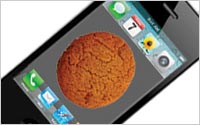Report: Apple To Replace UDID For Tracking
- by Steve Smith @popeyesm, June 11, 2012
 All according to whom you ask, Apple’s kinda-sorta decision to pull away from letting app developers access one of their iOS device’s
unique device identifiers (UDIDs) does or does not ring the death knell for app marketing or ad tracking generally on mobile. Whatever the case, Apple has been slow to implement restrictions on apps
that leverage the UDID. It is clear even to Apple that rattling their own ecosystem is not necessarily the best approach.
All according to whom you ask, Apple’s kinda-sorta decision to pull away from letting app developers access one of their iOS device’s
unique device identifiers (UDIDs) does or does not ring the death knell for app marketing or ad tracking generally on mobile. Whatever the case, Apple has been slow to implement restrictions on apps
that leverage the UDID. It is clear even to Apple that rattling their own ecosystem is not necessarily the best approach.
As the Worldwide Developer’s Conference opens this week, the company appears to be mollifying developers with unconfirmed news (a strategic leak?) in The Wall Street Journal that an alternative to familiar UDID tracking will be rolled out in coming weeks.
TheJournal report has no specifics of the plan, except the suggestion that Apple has come up with a way to allow developers to track key usage across apps without compromising privacy. Last year Apple was reacting to reports and Congressional inquiries about the theoretical possibility that user identities could be tied to otherwise anonymous device IDs, and that some very popular apps were scraping users’ contact data on their devices, although the latter issue had little to do with the former.
Whatever Apple’s solution to the problem, it almost certainly will try to address privacy first and foremost. More to the point, it may also give Apple more control over the user ID itself (no surprise there) and the ways in which developers can access phone data.
While Apple has muddled over the UDID issue, other companies have pursued either pre-existing or new alternative paths toward tracking use. There has been some support for an OpenUDID standard that creates an identifier for a device based on other device parameters, for instance -- and which claims not to allow identification with an individual.
While the Journal report does not promise an announcement at the WWDC meeting this week, one imagines that a new tracking solution could be baked into the upcoming iOS 6 update that the company will likely be discussing this week.
Our guess is that in addition to some IS mechanism that is resistant to being traced to a personally identifiable user, the new Apple approach will involve user empowerment in some way. An opt-in or opt-out mechanism would not be surprising. In all, it is a good sign that Apple is indicating its willingness to work with developers to ensure that the iOS platform is monetizable.
Privacy expert and consultant Alan Chapell of Chapell & Associates says it is difficult to say without details what Apple has in mind for a new tracking tool. But, he tells Mobile Marketing Daily: "If Apple's new UDID isn't attached to the device, it sort of begs the question -- how is the hash derived? And will this solution harmonize with other UDID replacements that are concurrently being discussed in the marketplace?"
How Apple implements a solution also raises issues of control and how the company metes out access to user data. "I would encourage Apple to ensure that they are addressing transparency, choice and other privacy issues with whatever they choose to replace the UDID," adds Chapell. Alluding to Microsoft's recent decision to turn its Do Not Track browser option on by default in upcoming versions of Internet Explorer, he says: "I hope they avoid being too paternalistic in terms of attempting to make choices for consumers. I also hope they avoid making this into an anti-competitive initiative that is disguised as privacy."
Mobile lead and principal at Mella Media Jordan Greene says that Apple's move demonstrates its power and influence. "The new Apple alternative could be a new way to let the mobile ad networks do their old tricks," he says. "The networks needed Apple to play the savior, as they were unable to develop an effective solution on their own -- or collectively -- to allow them to track user activity for multiple purposes. It really shows just how long the tentacles of Apple reach."


